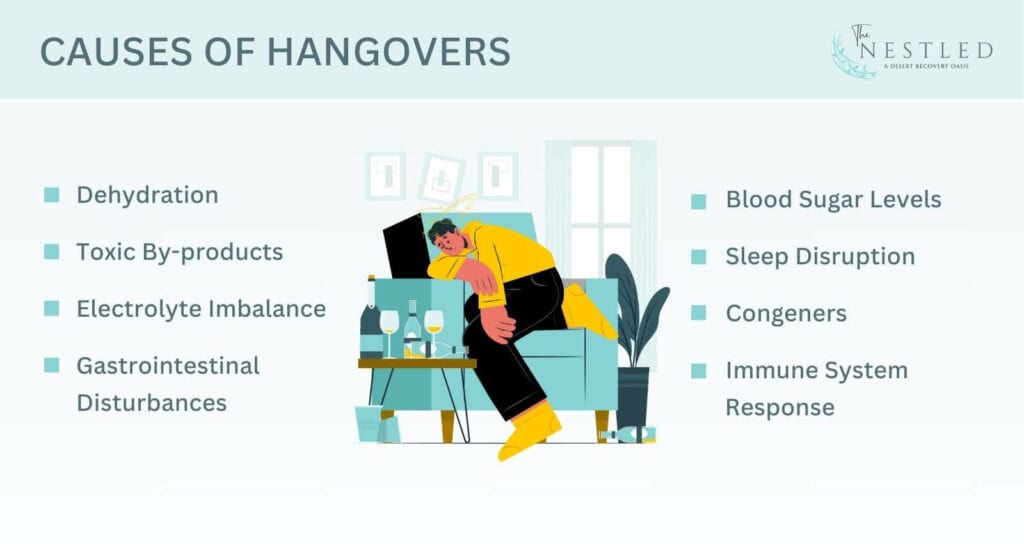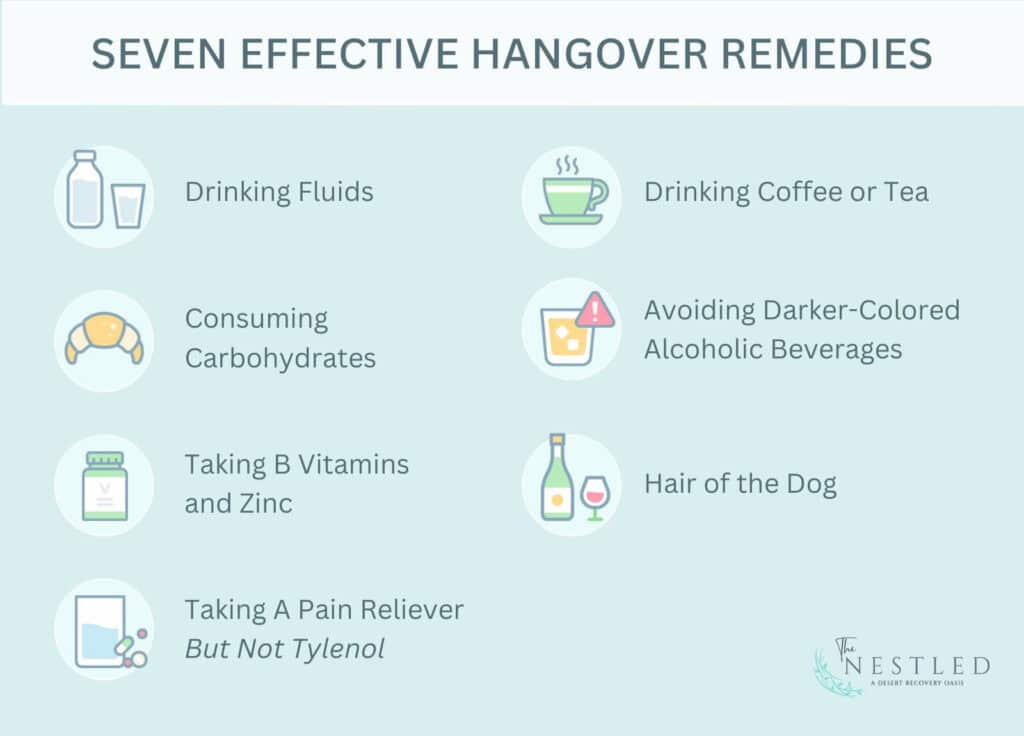A hangover refers to the unpleasant physiological and psychological effects that follow the consumption of alcohol, typically arising after the intoxicating effects of the alcohol have worn off. In the United States, hangover-related absenteeism (from school and work) and poor job performance cost $148 million dollars each year, according to the American Addiction Centers..
Hangovers are caused by dehydration, disturbances in the electrolyte balance, and the toxic effects of alcohol metabolites on the body. Disrupted sleep, inflammation, and acetaldehyde from the liver also play roles in the onset of hangover symptoms.
Hangover symptoms include headache, fatigue, nausea, dizziness, sensitivity to light and sound, and mood disturbances like irritability and anxiety. Some individuals also experience a rapid heartbeat, stomach pain, and muscle aches, which further contribute to the discomfort associated with a hangover.
Remedies for a hangover include rehydration, replenishing electrolytes, and restoring nutrients. Drinking water, sports drinks, or oral hydration solutions helps alleviate dehydration. Eating a hearty breakfast helps maintain blood sugar levels, while pain relievers like ibuprofen address headaches and muscle pains.
Hangover symptoms last between 24 and 72 hours. However, the duration of a hangover varies on the amount of alcohol consumed and individual factors like body weight, metabolism, and overall health. Most people start to feel better within a day, but complete recovery might take up to three days.
Fixing a hangover involves ensuring adequate hydration, consuming light and nutritious meals, resting in a quiet and dark environment, and taking over-the-counter medications to alleviate a headache or stomach upset.
What Is A Hangover?
A hangover is a combination of uncomfortable symptoms experienced after consuming excessive amounts of alcohol. According to the National Institute on alcohol abuse and Alcoholism, A hangover refers to a set of symptoms that occur as a consequence of drinking too much.
These symptoms typically begin after the blood alcohol concentration drops significantly and include headache, nausea, fatigue, sensitivity to light and sound, dizziness, and dehydration.
The severity of hangover symptoms varies based on the amount and type of alcohol consumed, the individual’s metabolism, hydration status, and genetic factors.
A survey by Harburg and colleagues (1993) on the prevalence of hangovers found that approximately 75 percent of the subjects who drank to intoxication reported experiencing a hangover at least some of the time. Alcohol disrupts biological rhythms, and its by-products cause toxic effects, contributing to the overall feeling of illness.
How Common Are Hangovers?
Hangovers are extremely common among those who consume alcohol. A study by Swift, R., & Davidson, D. (1998), ‘Alcohol hangover: Mechanisms and mediators,’ Generally, the greater the amount and duration of alcohol consumption, the more prevalent the hangover, although some people report experiencing a hangover after drinking low levels of alcohol (i.e., one to three alcoholic drinks), and some heavy drinkers do not report experiencing hangovers at all.
The prevalence of hangovers increases with the quantity of alcohol consumed and is more significant in situations involving binge drinking. Age, health, drinking habits, and the presence of congeners in alcoholic beverages also influence the likelihood of experiencing a hangover. Although hangovers are widespread, their intensity and frequency vary widely among individuals.
What Causes Hangovers?
A hangover occurs due to the body’s reaction to excessive alcohol consumption, dehydration, and the toxic effects of alcohol metabolites. A study by Swift, R., & Davidson, D. (1998), ‘Alcohol hangover: Mechanisms and mediators, Hangover symptoms have been attributed to the effects of the removal of alcohol from the brain and organs after alcohol exposure (i.e., withdrawal); the physiological effects of compounds produced as a result of alcohol’s metabolism.

- Dehydration: Alcohol’s diuretic effect increases urine production, leading to a fast loss of fluids and electrolytes. This loss causes dehydration, contributing to symptoms like thirst, dizziness, and weakness.
- Toxic By-products: The liver metabolizes alcohol into acetaldehyde, a poisonous compound more harmful than alcohol itself. High levels of acetaldehyde contribute to nausea, vomiting, sweating, and skin flushing.
- Electrolyte Imbalance: The excessive production of urine doesn’t just remove water but also essential electrolytes such as potassium and sodium, disrupting cellular functions and contributing to symptoms like fatigue and irritability.
- Gastrointestinal Disturbances: Alcohol irritates the stomach lining, increases acid production, and delays stomach emptying, which leads to abdominal pain, nausea, and vomiting.
- Blood Sugar Levels: Alcohol consumption causes blood sugar levels to fall, leading to fatigue, mood disturbances, and general weakness.
- Sleep Disruption: While alcohol induces sleepiness, it severely impacts sleep quality and architecture, reducing restorative sleep stages and leading to grogginess and cognitive impairment the next day.
- Congeners: These are chemical by-products of alcohol fermentation found in higher amounts in dark liquors. Due to their toxicity, congeners exacerbate hangover symptoms.
- Immune System Response: Drinking triggers an immune response that produces cytokines, which cause headaches, fatigue, and inability to concentrate.
Other behaviors associated with alcohol-drinking bouts also contribute to hangovers (e.g., other drug use, restricted food intake, and disruption of average sleep time). Likewise, personal characteristics (e.g., temperament, personality, and family history of alcoholism) contribute too.
What Are The Symptoms Of A Hangover?
An individual needs a blood alcohol concentration of 0.11% to experience a hangover. The more you drink, the more the chances of experiencing a hangover. Symptoms of a hangover are;
- Headache
- Fatigue
- Nausea
- Dizziness
- Sensitivity to light and sound
- Dry mouth
- Muscle aches
- Irritability
- Decreased ability to concentrate
- Rapid heartbeat
- Mood disturbances, such as anxiety and depression
- Shaking or tremors
- Increased sensitivity to tastes and smells
- Stomach pain
- Thirst
A study by Razvodovsky YE (2021), ‘Hangover Syndrome: Pathogenesis and Treatment,’ hangover manifests as a constellation of physiological (general malaise, headache, fatigue, nausea, dry mouth, thirst, lack of appetite) and mental (low mood, impaired concentration, cognitive deficit) symptoms.
The intensity of these symptoms varies and depends on the quantity of alcohol taken and the frequency of alcohol intake.
What Are The Effects Of Alcohol Withdrawal?
Effects of alcohol withdrawal include anxiety, tremors, insomnia, sweating, increased heart rate, hallucinations, and seizures. Alcohol withdrawal occurs when an individual drinking excessively for an extended period suddenly stops or significantly reduces their alcohol intake.
In Smith and Barnes’s 1983 study of 1,041 drinkers in New York State, 50 percent of the subjects who drank two or more drinks per day reported experiencing hangovers in the previous year. In contrast, subjects who consumed lower levels of alcohol reported fewer hangovers.
- Anxiety: As the sedative effects of alcohol dissipate, the central nervous system becomes hyperactive, causing feelings of anxiety and nervousness.
- Tremors: One of the first signs of withdrawal is often a tremor, particularly in the hands, which typically starts within hours after the last drink.
- Insomnia: The disruption of sleep patterns is common during withdrawal, with individuals experiencing difficulty falling asleep, staying asleep, or having unrestful sleep.
- Sweating: Sweating, hefty night sweats, is a common physical reaction to alcohol withdrawal.
- Increased Heart Rate: The heart rate increases, sometimes significantly, as the body reacts to the lack of alcohol.
- Nausea and Vomiting: Withdrawal often affects the stomach, leading to nausea or vomiting, which worsens other symptoms like dehydration.
- Hallucinations: Some individuals experience visual, auditory, or tactile hallucinations within the first 48 hours after stopping or reducing alcohol.
- Seizures: Seizures are among the most severe effects of alcohol withdrawal and typically occur within the first 24 to 48 hours after the last drink.
- Delirium Tremens (DTs): Delirium tremens is a severe form of alcohol withdrawal that includes confusion, rapid heartbeat, fever, and severe agitation. This condition is life-threatening and usually starts 48 to 72 hours after the last alcohol consumption.
- Mood Swings: Frequent and rapid changes in mood, including irritability and emotional volatility, are expected during the withdrawal process.
The revised Clinical Institute Withdrawal Assessment for Alcohol (CIWA-Ar) scale measures ten withdrawal-associated items: nausea and vomiting, tremor, sweating, anxiety, agitation, headache, disturbances in the sense of touch, hearing, and vision (e.g., hallucinations), and orientation.
What Are The Effects Of Alcohol Metabolites?
The effects of alcohol metabolites are the production of acetaldehyde and acetate by-products, which affect the body’s physiological functions and overall health.
Acetaldehyde: Acetaldehyde processed by the liver contributes to liver damage. Its presence leads to symptoms such as nausea, vomiting, facial flushing, and increased heart rate. Over time, chronic exposure to acetaldehyde results in serious health issues, including alcoholic liver disease and cancer. The National Toxicology Program of the US Department of Health and Human Services lists the consumption of alcoholic beverages as a known human carcinogen.
Acetate: After acetaldehyde, the body further metabolizes it into acetate, which is less harmful. However, the process of converting acetaldehyde to acetate causes a short-term boost in metabolic rate. It contributes to metabolic disturbances.
The overall impact of these metabolites is negative, stressing the liver, altering metabolic rates, and contributing to the toxic effects associated with both acute and chronic alcohol consumption.
When To See A Doctor Due To A Hangover?
It is time to see a doctor when hangover symptoms become severe or persistent beyond the usual recovery time. If hangover symptoms such as headache, nausea, or dizziness persist for more than 48 hours, or if severe symptoms like intense abdominal or head pain, confusion, hallucinations, or signs of severe dehydration occur, it is critical to seek medical help.
These signs could indicate more severe conditions, such as alcohol poisoning, dehydration, or acute alcohol withdrawal, which require professional medical intervention.
When Is A Hangover An Emergency?
A hangover becomes an emergency when symptoms are severe, indicative of life-threatening conditions, or do not respond to typical recovery measures.
Urgent medical attention is needed if experiencing:
- Seizures
- Severe confusion
- Persistent vomiting
- High fever
- Rapid heartbeat
- Trouble breathing
- Intense chest pain
Other severe signs like blue-tinged or pale skin, extreme lethargy, unresponsiveness and hallucinations indicate alcohol poisoning.
What Happens During A Hangover?
During a hangover, alcohol acts as a diuretic. It leads to increased urine production and subsequent dehydration, which causes symptoms like thirst, dizziness, and lightheadedness. Liver alcohol metabolism produces toxic by-products, such as acetaldehyde, contributing to nausea, vomiting, and overall malaise. The presence of congeners in darker alcoholic beverages worsens these effects.
Alcohol also disrupts sleep quality and patterns, leading to fatigue and irritability due to inadequate rest. It interferes with the body’s glucose regulation, often causing hypoglycemia, which results in feelings of weakness, mood disturbances, and decreased concentration.
The immune system responds to alcohol by releasing cytokines, which are inflammatory substances that enhance feelings of illness and discomfort. Collectively, these reactions contribute to the typical symptoms experienced during a hangover, affecting the body’s neurological, gastrointestinal, and cardiovascular systems.
What Are 7 Hangover Remedies?
According to an article reviewed by Howard E. LeWine, MD, for Harvard Health, the 7 hangover remedies are drinking fluids, taking carbohydrates, avoiding dark alcoholic beverages, pain relievers, coffee or tea, vitamin B or zinc, and the hair of the dog.

1. Drinking Fluids: Rehydrating is critical to alleviating many hangover symptoms. Alcohol causes dehydration, so drinking water or electrolyte-rich sports drinks helps replenish lost fluids and aid in recovery.
2. Getting Some Carbohydrates Into Your System: Alcohol reduces blood sugar levels, leading to fatigue and weakness. Consuming carbohydrates helps stabilize blood sugar levels, provides energy, and improves mood and cognitive function.
3. Avoiding Darker-Colored Alcoholic Beverages: Darker liquors contain higher levels of congeners, chemical by-products of alcohol fermentation, which intensify hangover symptoms. Opting for lighter-colored beverages potentially reduces the severity of a hangover.
4. Taking A Pain Reliever- But Not Tylenol: Non-steroidal anti-inflammatory drugs like ibuprofen or aspirin help relieve headaches and muscle pains associated with hangovers. However, Tylenol (acetaminophen) should be avoided as it increases the risk of liver damage because the liver is already processing alcohol.
5. Drinking Coffee or Tea: Caffeine in coffee or tea helps combat the fatigue associated with hangovers. It also acts as a mild vasoconstrictor, alleviating headache symptoms. However, caffeine also contributes to dehydration, so it’s essential to drink water.
6. Taking B Vitamins and Zinc: Alcohol consumption depletes nutrients in the body, including B vitamins and zinc. Replenishing these nutrients aids in the recovery process and potentially reduces the duration of hangover symptoms.
7. Hair of the Dog: This involves drinking more alcohol the following day to alleviate hangover symptoms. While it might temporarily mask symptoms, this approach is generally not recommended as it prolongs the alcohol metabolism process and potentially leads to increased dependency.
Why Do I Get Such Bad Hangovers?
According to the American Addiction Center, bad hangovers often result from individual factors like genetics, body weight, overall health, and the ability to metabolize alcohol efficiently. Consuming large amounts of alcohol, significantly darker spirits with higher congener contents, also exacerbates the severity of hangover symptoms.
How Much Alcohol Does It Take To Get A Hangover?
The amount of alcohol necessary to cause a hangover varies significantly among individuals, but generally, consuming more than one’s body metabolizes in an hour—approximately one standard drink—increases the likelihood of a hangover. Factors such as body size, hydration level, and food intake also influence this threshold.
What Are The Effects Of Taking Drugs With Alcohol?
Mixing drugs with alcohol leads to dangerous interactions, intensifying the effects of both substances and increasing harmful side effects or overdose. Alcohol alters the metabolism and effectiveness of drugs, leading to unpredictable and potentially life-threatening reactions, such as respiratory distress, impaired motor control, and severe cognitive impairments.
Can Hangovers Impact Your Heart Rate?
Yes, hangovers temporarily increase your heart rate due to dehydration and the body’s stress response to alcohol toxicity, potentially causing palpitations or tachycardia.
Do Hangovers Affect Your Immune System?
Hangovers suppress the immune system by inducing an inflammatory response, which makes you more susceptible to infections temporarily.
Can Frequent Hangovers Lead To Permanent Brain Damage?
Repeated hangovers, especially those involving heavy alcohol consumption, contribute to long-term cognitive decline and brain damage due to neurotoxic effects and vitamin deficiencies. Robert Swift’s 1998 study, ‘alcohol hangover,’ attributes hangover symptoms to several causes, including the direct physiological effects of alcohol on the brain and other organs.
How Do Hangovers Influence Hormone Levels?
Alcohol consumption and hangovers disrupt normal hormone production, affecting cortisol and sex hormones, which influence mood, stress levels, and metabolic functions.
What are the Effects of Alcohol Metabolites?
The effects of alcohol metabolites include the production of acetaldehyde and acetate, which negatively impact physiological functions and overall health. Acetaldehyde, a toxic by-product, contributes to symptoms such as nausea, vomiting, facial flushing, and increased heart rate. Chronic exposure to acetaldehyde leads to serious health issues, including liver disease and cancer. For more insights, you can explore topics related to prenatal alcohol exposure.
Acetate, another metabolite, causes metabolic disturbances and contributes to the toxic effects associated with alcohol consumption. Understanding these effects through psychotherapy for addiction can provide a deeper understanding of how alcohol impacts the body and how to mitigate its effects.

Share This Post




